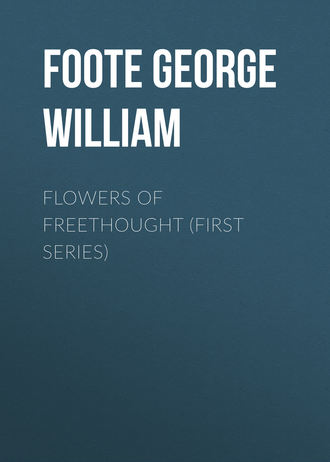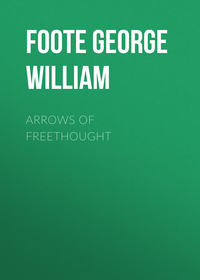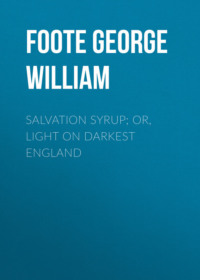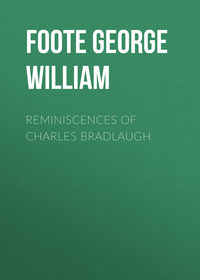 полная версия
полная версияFlowers of Freethought (First Series)
The gospel of Freethought teaches us to distinguish between the knowable and the unknowable. We cannot fathom the infinite "mystery of the universe" with our finite plummet, nor see aught behind the veil of death. Here is our appointed province:
This world which is the worldOf all of us, and where in the endWe find our happiness or not at all.Let us make the best of this world and take our chance of any other. If there is a heaven, we dare say it will hold all honest men. If it will not, those who go elsewhere will at least be in good company.
Our salvation is here and now. It is certain and not contingent. We need not die before we realise it Ours is a gospel, and the only gospel, for this side of the grave. The promises of theology cannot be made good till after death; ours are all redeemable in this life.
We ask men to acknowledge realities and dismiss fictions. When you have sifted all the learned sermons ever preached, you will find very little good grain. Theology deals with dreams and phantasies, and gives no guidance to practical men. The whole truth or life may be summed up in a few words. Happiness is the only good, suffering the only evil, and selfishness the only sin. And the whole duty of man may be expressed in one sentence, slightly altered from Voltaire – Learn what is true in order to do what is right. If a man can tell you anything about these matters, listen to him; if not, turn a deaf ear, and let him preach to the wind.
The only noble things in this world are great hearts and great brains. There is no virtue in a starveling piety which turns all beauty into ugliness and shrivels up every natural affection. Let the heart beat high with courage and enterprise, and throb with warm passion. Let the brain be an active engine of thought, imagination and will. The gospel of sorrow has had its day; the time has come for the gospel of gladness. Let us live out our lives to the full, radiating joy on all in our own circle, and diffusing happiness through the grander circle of humanity, until at last we retire from the banquet of life, as others have done before us, and sink in eternal repose.
ON RIDICULE
Goldsmith said there are two classes of people who dread ridicule – priests and fools. They cry out that it is no argument, but they know it is. It has been found the most potent form of argument. Euclid used it in his immortal Geometry; for what else is the reductio ad absurdum which he sometimes employs? Elijah used it against the priests of Baal. The Christian fathers found it effective against the Pagan superstitions, and in turn it was adopted as the best weapon of attack on them by Lucian and Celsus. Ridicule has been used by Bruno, Erasmus, Luther, Rabelais, Swift, and Voltaire, by nearly all the great emancipators of the human mind.
All these men used it for a serious purpose. They were not comedians who amused the public for pence. They wielded ridicule as a keen rapier, more swift and fatal than the heaviest battle-axe. Terrible as was the levin-brand of their denunciation, it was less dreaded than the Greek fire of their sarcasm. I repeat that they were men of serious aims, and indeed how could they have been otherwise? All true and lasting wit is founded on a basis of seriousness; or else, as Heine said, it is nothing but a sneeze of the reason. Hood felt the same thing when he proposed for his epitaph: "Here lies one who made more puns, and spat more blood, than any other man of his time."
Buckle well says, in his fine vindication of Voltaire, that he "used ridicule, not as the test of truth, but as the scourge of folly." And he adds —
"His irony, his wit, his pungent and telling sarcasms, produced more effect than the gravest arguments could have done; and there can be no doubt that he was fully justified in using those great resources with which nature had endowed him, since by their aid he advanced the interests of truth, and relieved men from some of their most inveterate prejudices."
Victor Hugo puts it much better in his grandiose way, when he says of Voltaire that "he was irony incarnate for the salvation of mankind."
Voltaire's opponents, as Buckle points out, had a foolish reverence for antiquity, and they were impervious to reason. To compare great things with small, our opponents are of the same character. Grave argument is lost upon them; it runs off them like water from a duck. When we approach the mysteries of their faith in a spirit of reverence, we yield them half the battle. We must concede them nothing. What they call reverence is only conventional prejudice. It must be stripped away from the subject, and if argument will not remove the veil, ridicule will. Away with the insane notion that absurdity is reverend because it is ancient! If it is thousands of years old, treat it exactly as if it were told the first time to-day. Science recognises nothing in space and time to invalidate the laws of nature. They prevailed in the past as well as in the present, in Jerusalem as well as in London. That is how Science regards everything; and at bottom Science and common-sense are one and the same.
Professor Huxley, in his admirable little book on Hume, after pointing out the improbability of centaurs, says that judged by the canons of science all "miracles" are centaurs. He also considers what would happen if he were told by the greatest anatomist of the age that he had seen a centaur. He admits that the weight of such authority would stagger him, but it would scarcely make him believe. "I could get no further," says Huxley, "than a suspension of judgment."
Now I venture to say that if Johannes Müller had told Huxley any such thing, he would have at once concluded that the great anatomist was joking or suffering from hallucination. As a matter of fact trained investigators do not see these incredible monstrosities, and Huxley's hypothetical case goes far beyond every attested miracle. But I do say that if Johannes Muller, or anyone else, alleged that he had seen a centaur, Huxley would never think of investigating the absurdity.
Yet the allegation of, a great anatomist on such a matter is infinitely more plausible than any miraculous story of the Christian religion. The "centaurs" of faith were seen centuries ago by superstitious people; and what is more, the relation of them was never made by the witnesses, but always by other people, who generally lived a few generations at least after the time.
What on earth are we to do with people who believe in "centaurs" on such evidence, who make laws to protect their superstition, and appoint priests at the public cost to teach the "centaur" science? The way to answer this question is to ask another. How should we treat people who believed that centaurs could be seen now? Why, of course, we should laugh at them.
And that is how we should treat people who believe that men-horses ever existed at all.
Does anybody ask that I shall seriously discuss whether an old woman with a divining-rod can detect hidden treasures; whether Mr. Home floated in the air or Mrs. Guppy sailed from house to house; whether cripples are cured at Lourdes or all manner of diseases at Winifred's Well? Must I patiently reason with a man who tells me that he saw water turned into wine, or a few loaves and fishes turned into a feast for multitudes, or dead men rise up from their graves? Surely not. I do what every sensible man does. I recognise no obligation to reason with such hallucinate mortals; I simply treat them with ridicule.
So with the past. Its delusions are no more entitled to respect than those of to-day. Jesus Christ as a miracle-worker is just as absurd as any modern pretender. Whether in the Bible, the Koran, the Arabian Nights, Monte Christo, or Baron Munchausen, a tremendous "walker" is the fit subject of a good laugh. And Freethinkers mean to enjoy their laugh, as some consolation for the wickedness of superstition. The Christian faith is such that it makes us laugh or cry. Are we wrong in preferring to laugh?
There is an old story of a man who was plagued by the Devil. The fiend was always dropping in at inconvenient times, and making the poor fellow's life a hell on earth. He sprinkled holy water on the floor, but by-and-bye the "old 'un" hopped about successfully on the dry spots. He flung things at him, but all in vain. At last he resolved on desperate measures. He plucked up his courage, looked the Devil straight in the face, and laughed at him. That ended the battle. The Devil could not stand laughter. He fled that moment and never returned.
Superstition is the Devil. Treat him to a hearty wholesome laugh. It is the surest exorcism, and you will find laughter medicinal for mind and body too. Ridicule, and again ridicule, and ever ridicule!
WHO ARE THE BLASPHEMERS?
Atheists are often charged with blasphemy, but it is a crime they cannot commit. God is to them merely a word, expressing all sorts of ideas, and not a person. It is, properly speaking, a general term, which includes all that there is in common among the various deities of the world. The idea of the supernatural embodies itself in a thousand ways. Truth is always simple and the same, but error is infinitely diverse. Jupiter, Jehovah, and Mumbo-Jumbo are alike creations of human fancy, the products of ignorance and wonder. Which is the God is not yet settled. When the sects have decided this point, the question may take a fresh turn; but until then god must be considered as a generic term, like tree or horse or man; with just this difference, however, that while the words tree, horse, and man express the general qualities of visible objects, the word god expresses only the imagined qualities of something that nobody has ever seen.
When the Atheist examines, denounces, or satirises the gods, he is not dealing with persons but with ideas. He is incapable of insulting God, for he does not admit the existence of any such being.
Ideas of god may be good or bad, beautiful or ugly; and according as he finds them the Atheist treats them. If we lived in Turkey, we should deal with the god of the Koran; but as we live in England, we deal with the god of the Bible. We speak of that god as a being, just for convenience sake, and not from conviction. At bottom, we admit nothing but the mass of contradictory notions between Genesis and Revelation. We attack not a person but a belief, not a being but an idea, not a fact but a fancy.
Lord Brougham long ago pointed out, in his Life of Voltaire, that the great French heretic was not guilty of blasphemy, as his enemies alleged; since he had no belief in the actual existence of tne god he dissected, analysed, and laughed at. Mr. Ruskin very eloquently defends Byron from the same charge. In Cain and elsewhere, the great poet does not impeach God; he merely impeaches the orthodox creed. We may sum up the whole matter briefly. No man satirises the god he believes in, and no man believes in the god he satirises.
We shall not, therefore, be deterred by the cry of "blasphemy!" which is exactly what the Jewish priests shouted against Jesus Christ. If there is a God, he cannot be half such a fool and blackguard as the Bible declares. In destroying the counterfeit we do not harm the reality. And as it is better, in the words of Plutarch, to have no notion of the gods than to have notions which dishonor them, we are satisfied that the Lord (if he exist) will never burn us in hell for denying a few lies told in his name.
The real blasphemers are those who believe in God and blacken his character; who credit him with less knowledge than a child, and less intelligence than an idiot; who make him quibble, deceive, and lie; who represent him as indecent, cruel, and revengeful; who give him the heart of a savage and the brain of a fool. These are the blasphemers.
When the priest steps between husband and wife, with the name of God on his lips, he blasphemes. When, in the name of God, he resists education and science, he blasphemes. When, in the name of God, he opposes freedom of thought and liberty of conscience, he blasphemes. When, in the name of God, he robs, tortures, and kills those who differ from him, he blasphemes. When, in the name of God, he opposes the equal rights of all, he blasphemes. When, in the name of God, he preaches content to the poor and oppressed, flatters the rich and powerful, and makes religious tyranny the handmaiden of political privilege, he blasphemes. And when he takes the Bible in his hand, and says it was written by the inspiration of God, he blasphemes almost beyond forgiveness.
Who are the blasphemers? Not we who preach freedom and progress for all men; but those who try to bind the world with chains of dogma, to burden it, in God's name, with all the foul superstitions of its ignorant past.
CHRISTIANITY AND COMMON SENSE
There are two things in the world that can never get on together – religion and common sense. Religion deals with the next life, common sense with this; religion points to the sky, common sense to the earth; religion is all imagination, common sense all reason; religion deals with what nobody can understand, common sense with what everybody can understand; religion gives us no return for our investments but flash notes on the bank of expectation, common sense gives us good interest and full security for our capital. They are as opposite as two things can possibly be, and they are always at strife. Religion is always trying to fill the world with delusions, and common sense is always trying to drive them away. Religion says Live for the next world, and common sense says Live for this.
It is in the very nature of things that religion and common sense should hate and oppose each other. They are rivals for the same prize – aspirants to the same throne. In every age a conflict has been going on between them; and although common sense is fast getting the upper hand to-day, the war is far from ended, and we may see some fierce struggles before the combat closes. There can, however, be no doubt as to the issue; for science has appeared on the scene with the most deadly weapons of destruction, and science is the sworn ally of common sense. Nay, is not Science the mighty child of common sense – the fruit of Reason from the lusty embrace of Nature?
Common sense is primitive logic. It does not depend on books, and it is superior to culture. It is the perception of analogy – the instinct of causation. It guides the savage through trackless forests, and the astronomer through infinite space. It makes the burnt child dread the fire, and a Darwin see in a few obvious facts the solution of a mystery. It built the first hut and the last palace; the first canoe and the last ocean steamer. It constructed docks, and laid down railways, applied steam to machinery and locomotion, prompted every mechanical discovery, instigated all material progress, and transformed an ape-like beast into a civilised man.
Even the highest art is full of common sense. Sanity and simplicity are the distinguishing marks of the loftiest genius, which may be described as inspired common sense. The great artist never loses touch of fact; he may let his imagination soar as high as the stars, but he keeps his feet firm-planted on the ground. All the world recognises the sublimity of Greek sculpture and Shakespeare's plays, because they are both true to nature and fact and coincident with everlasting laws. The true sublime is not fantastic; it is solid and satisfying, like a mighty Alp, deep-rooted first of all in the steadfast earth, and then towering up with its vineyards, its pastures, its pine-forests, its glaciers, its precipices, and last of all the silence of infinitude brooding over its eternal snows.
Common sense, the civiliser, has had an especially hard fight with that particular form of religion known as Christianity. When Tertullian said that Christianity was to be believed because it was incredible, he spoke in the true spirit of faith; just as old Sir Thomas Browne did when he found the marvels of religion too weak for his credulity, David Hume expressed the same truth ironically at the conclusion of his Essay on Miracles, when he said that it was not reason that persuaded any Christian of the truth of his creed, which was established on the higher ground of faith, and could not be accepted without a miracle.
Common sense is blasphemy. It is the thing which religion dreads most, and which the priests most mortally hate. Common sense dispenses with learned disquisitions, and tries everything with simple mother wit. If, for instance, it hears that a whale swallowed a man, and vomited him up safe and sound three days after, it does not want to know all the physiology of men and whales before deciding if the story is true; it just indulges in a hearty laugh and blows the story to Hades. Miracle-mongers are quite helpless when a man turns round and says, "My dear sir, that story's just a trifle too thin." They see his case is a hopeless one, and leave him to the tender mercies of the Lord of Hosts.
Learning is all very well in its way, but common sense is a great deal better. It is infinitely the best weapon to use against Christianity. Without a knowledge of history, without being acquainted with any science but that of daily life, without a command of Hebrew, Latin and Greek, or any other language than his own, a plain man can take the Bible in his hand and easily satisfy himself it is not the word of God. Common sense tells him not to believe in contradictory statements; common sense tells him that a man could not have found a wife in a land where there were no women; common sense tells him that three millions of people never marched out of any country in one night; common sense tells him that Jesus Christ could not have "gone up" from two places at once; common sense tells him that turning devils out of men into pigs is a fable not half as good as the poorest of Æsop's; common sense tells him that nobody but a skunk would consent to be saved from the penalty of his own misdeeds by the sufferings of an innocent man; common sense tells him that while men object to having their pockets picked and their throats cut, they want no divine command against theft and murder; common sense tells him that God never ordered the committal of such atrocities as those ascribed to him in the Bible; and common sense tells him that a God of mercy never made a hell.
Yes, all this is perfectly clear, and the priests know it. That is why they cry out Blasphemy! every time they meet it. But that is also precisely the reason why we should employ it against them. The best antidote to superstition, the worst enemy of priestcraft, and the best friend of man, is (to parody Danton's famous formula) Common Sense, and again Common Sense, and for ever Common Sense.
THE LORD OF LORDS.3
We are in the midst of a political crisis. The House of Lords opposes a reform unanimously voted by the House of Commons. Great demonstrations are being held all over the country, to insist on the popular will being carried into effect, and there is a growing cry of "Down with the Lords." A spectator from another planet might wonder at all the fuss. He might marvel how forty millions of people needed to stamp and gesticulate against a handful of obstructives. He might imagine that they had only to decree a thing and it would immediately be; that all opposition to their sovereign will would melt away the moment they declared it. This traveller, however, would soon be undeceived. A little study would show him that the people are kept in check by faith and custom. He would learn that the nation is tied down like Gulliver was, by ligatures springing from its own head. Behind the King there is a King of Kings; behind the Lords there is a Lord of Lords. Behind every earthly despotism there is a heavenly one. The rulers of mankind overawe the people by religious terrors. They keep a body of men in their pay, the black army of theology, whose business it is to frighten people from their rights by means of a ghost behind the curtain. Nobody has ever seen the bogie, but we are taught to believe in it from our infancy, and faith supplies the deficiencies of sight. Thus we are enslaved by our own consent. Our will is suborned against our interests. We wear no chains to remind us of our servitude, but our liberty is restrained by the subtle web of superstition, which is so fine as to be imperceptible except to keen and well-practised eyes, and elastic enough to cheat us with a false sense of freedom.
Yes, we must seek in religion the secret of all political tyranny and social injustice. Not only does history show us the bearing of religion on politics – we see it to-day wherever we cast our gaze. Party feeling is so embittered in France because the sharp line of division in politics corresponds with the sharp line of division in religion. On the one side there is Freethought and Republicanism, and on the other Catholicism and Monarchy. Even in England, which at present knows less of the naked despotism of the Catholic Church than any other European country, we are gradually approximating to a similar state of things. Freethougnt is appearing upon the public stage, and will play its peculiar part as naturally as religion does. Those who fancy that theology and politics have no necessary relations, that you may operate in the one without affecting the other, and that they can and should be kept distinct, are grossly mistaken. Cardinal Newman has well shown how it is the nature of ideas to assimilate to themselves whatever agrees with them, and to destroy whatever disagrees. When once an idea enters the human mind it acts according to the necessary laws of thought. It changes to its own complexion all its mental surroundings, and through every mental and moral channel influences the world of practice outside. The real sovereigns of mankind, who sway its destinies with irresistible power, are not the czars, emperors, kings and lords, nor even the statesmen who enact laws when public sentiment is ripe; they are the great thinkers who mould opinion, the discoverers and enunciators of Truth, the men of genius who pour the leaven of their ideas and enthusiasm into the sluggish brain of humanity.
Even in this crisis it is easy to see how Religion and Freethought are at variance. The Liberal party is not pledged to the abolition of the House of Lords, but the Radical party is. Orthodox Liberalism is Christian, only a little less so than orthodox Conservatism; but Radicalism is very largely sceptical. It would surprise the dullards of both parties to learn how great a portion of the working energy of Radicalism is supplied by Freethinkers. True, many of them are unavowed Freethinkers, yet they are of our party although they do not wear our colors. But setting all these aside, I assert that Radicalism would be immensely weakened by the withdrawal of declared Freethinkers from its ranks. No one in the least acquainted with political organisation would think of disputing this.
Belief in God is the source and principle of all tyranny. This lies in the very nature of things. For what is God? All definitions of religion from Johnson's down to that of the latest dictionary agree on this one point, that it is concerned with man's relations to the unknown. Yes, God is the Unknown, and theology is the science of ignorance. Earl Beaconsfield, in his impish way, once said that where our knowledge ends our religion begins. A truer word was never spoken.
Now the unknown is the terrible. We become fearful the moment we confront the incalculable. Go through the history of religions, consult the various accounts of savage and barbarous faiths at present extant, and you will find that the principle of terror, springing from the unknown, is the essential feature in which they all agree. This terror inevitably begets slavishness. We cannot be cowardly in this respect without its affecting our courage in others. The mental serf is a bodily serf too, and spiritual fetters are the agencies of political thraldom. The man who worships a tyrant in heaven naturally submits his neck to the yoke of tyrants on earth. He who bows his intellect to a priest will yield his manhood to a king. Everywhere on earth we find the same ceremonies attending every form of dependence. The worshipper who now kneels in prayer to God, like the courtier who backs from the presence of the monarch, is performing an apology for the act of prostration which took place alike before the altar and the throne. In both cases it was the adoration of fear, the debasement of the weak before the seat of irresponsible power.









